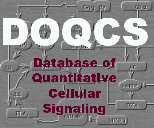
|
Enter a Search String | | Special character and space not allowed in the query term.
Search string should be at least 2 characters long. |
Molecule Parameter List for mGluRAntag | The statistics table lists the distribution of a molecule acting either as a substrate, product, enzyme or as a molecule within the network.
The text color of a molecule is highlighted by  color. color. | | Statistics |
| mGluRAntag participated as | Molecule | Sum total of | Enzyme | Substrate of an enzyme | Product of an enzyme | Substrate in Reaction | Product in Reaction | | No. of occurrences | 1 | 0 | 0 | 0 | 0 | 1 | 0 |
Accession and Pathway Details | |
| Accession Name | Accession No. | Accession Type | Pathway Link | NonOsc_Ca_
IP3metabolism | 31 | Network |
MIPP, CaMKII, CaM,
PKC, IP3-3K, CaRegulation,
Gq, PLCbeta, 134_dephos,
145_dephos, IP4-system, IHP-system,
1345_dephos | | This network models detailed metabolism of Ins(145)P3, integrated with GPCR mediated PLCbeta activation and Ca release by the InsP3 receptor in the neuron. It is similar to the NonOsc_Ca_IP3metab model (accession 23) except that some enzymes have been modified to have reversible kinetics rather than Michaelis-Menten kinetics. These modified enzymes belong to the groups: IP4-system, IP3-3K, 145_dephos and 134_dephos. Mishra J, Bhalla US. Biophys J. 2002 Sep;83(3):1298-316. |
mGluRAntag acting as a Molecule in NonOsc_Ca_IP3metabolism Network
| Name | Accession Name | Pathway Name | Initial Conc.
(uM) | Volume
(fL) | Buffered | | mGluRAntag | NonOsc_Ca_
IP3metabolism
Accession No. : 31 | Gq
Pathway No. : 150 | 0 | 1000 | Yes | | I implement this as acting only on the Rec-Gq complex, based on a more complete model PLC_Gq48.g which showed that the binding to the receptor alone contributed only a small amount. |
mGluRAntag acting as a Substrate in a reaction in NonOsc_Ca_IP3metabolism Network
| Kd is calculated only for second order reactions, like nA+nB <->nC or nA<->nC+nD, where n is number and A,B,C,D are molecules, where as for first order reactions Keq is calculated.
Kd for higher order reaction are not consider. |
| Name | Accession Name | Pathway Name | Kf | Kb | Kd | tau | Reagents | Antag-bind-Rec-G
q | NonOsc_Ca_
IP3metabolism
Accession No. : 31 | Gq
Pathway No. : 150 | 60
(uM^-1 s^-1) | 0.01
(s^-1) | Kd(bf) = 0.0002(uM) | - | Substrate
Rec-Gq
mGluRAntag
Product
Blocked-rec-Gq
| | The rate consts give a total binding affinity of under 0.2 nM, good for a strong antagonist. |
| Database compilation and code copyright (C) 2022, Upinder S. Bhalla and NCBS/TIFR
This Copyright is applied to ensure that the contents of this database remain freely available. Please see FAQ for details. |
|
